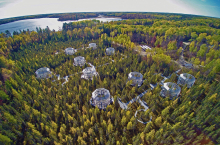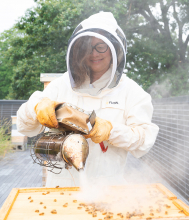
Georgia Tech researchers show that rising temperatures in northern regions may damage peatlands: critical ecosystems for storing carbon from the atmosphere — and could decouple vital processes in microbial support systems.

As we celebrate Women's History Month and look to the future of our field, meet seven of Georgia Tech's real-life superheroines of life science — and science fiction.

While Georgia Tech is of course home to yellow jackets, it’s also home to many other insects that are part of the complex ecosystem of campus.
Mike Farrell, I. King Jordan, and Phil Santangelo working on $14.7 million DARPA funded project to developing novel diagnostic devices able to rapidly identify the bacteria causing sepsis.


